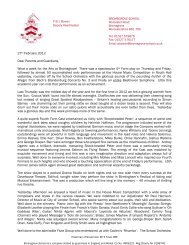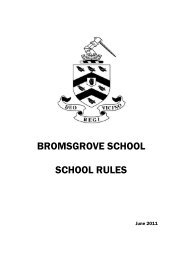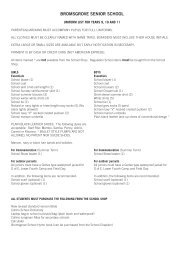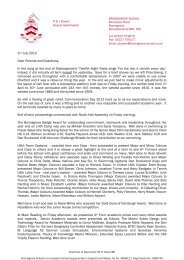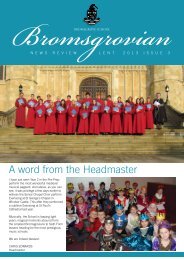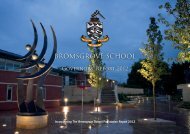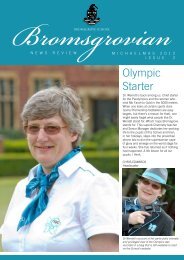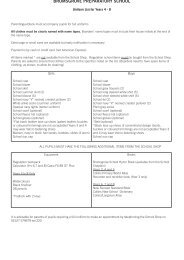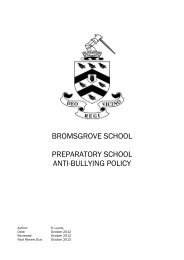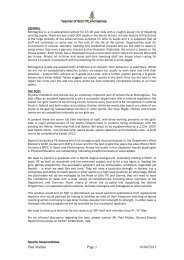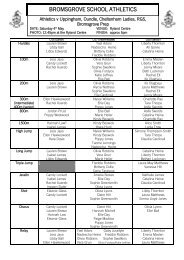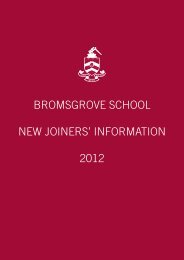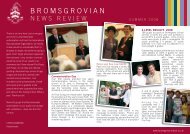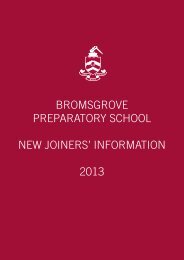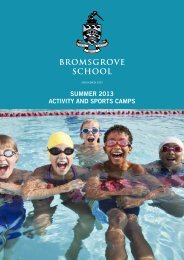Sixth Form Course Booklet 2013 - Bromsgrove School
Sixth Form Course Booklet 2013 - Bromsgrove School
Sixth Form Course Booklet 2013 - Bromsgrove School
Create successful ePaper yourself
Turn your PDF publications into a flip-book with our unique Google optimized e-Paper software.
MATHEMATICS A LEVEL<br />
WHY STUDY MATHEMATICS?<br />
Mathematics is a unique subject that stands as a creative subject in its own right, but which also underpins science,<br />
engineering and much of business studies and other social sciences. The mathematical skills of being able to think<br />
abstractly, logically and deductively, to construct a rigorous argument and to draw sound conclusions from appropriate<br />
evidence are highly desirable and transferable to many different settings. You will learn how to analyse data so that you<br />
can judge the value of statistical arguments, you will develop an appreciation of how motion can be modelled and you<br />
will learn the techniques that will enable you to extend the study of the subject, or its dependent subjects.<br />
Mathematics increasingly becomes algebraically rather than arithmetically based.<br />
Those wishing to study Further Mathematics A level should study A level Mathematics in the Lower <strong>Sixth</strong>. A level<br />
Further Mathematics will then be covered in the Upper <strong>Sixth</strong>. Pupils who embark on a full Further Mathematics course<br />
can later opt to reduce this to AS level Further Mathematics: this is usually done to ensure that a grade A in<br />
Mathematics A level is achieved.<br />
AIMS OF THE COURSE<br />
1. To develop an interest in mathematics.<br />
2. To develop an appreciation of the value of mathematics in the modern world today.<br />
3. To develop an ability to think abstractly and logically.<br />
4. To learn, understand and be able to use a range of mathematical skills and techniques.<br />
5. To encourage a sense of achievement in meeting an intellectual challenge.<br />
6. To lay foundations for the further study of the subject or the study of dependent subjects.<br />
7. To develop the ability to model real-life situations and the ability to appreciate that assumptions must be made<br />
in order to do this.<br />
SKILLS NEEDED FOR AND DEVELOPED IN THE COURSE<br />
An interest in mathematics; sound algebraic skills; a readiness to rise to challenges and to see them through to a<br />
successful conclusion; sound organisational skills and a readiness to set time to learn critical facts and techniques.<br />
REQUIREMENTS FOR STARTING THE COURSE<br />
A minimum of a grade B in Higher Level GCSE or IGCSE Mathematics, although an A or A* is preferable. Reasonable<br />
success at AS level if you are continuing from that stage.<br />
<strong>Course</strong> followed: Mathematics<br />
Examination Board: Edexcel<br />
CONTENT OF THE COURSE UNITS<br />
For pupils studying A2 mathematics in the Upper <strong>Sixth</strong>, having completed AS mathematics in the Lower <strong>Sixth</strong>, the<br />
course consists of three further units, two in pure mathematics and one in applied. The two pure units are C3 Methods<br />
for Advanced Mathematics and C4 Application of Advanced Mathematics, which together complete the coverage of the<br />
national mathematics common core. Pupils can choose their applied unit from Mechanics 2 or Statistics 2 (if they have<br />
completed Mechanics 1 or Statistics 1 in the Lower <strong>Sixth</strong>) or Decision Mathematics 1. (Decision Mathematics is the<br />
branch of the subject that underpins business studies and related subjects.)<br />
For pupils in the Lower <strong>Sixth</strong> who are undertaking the first year of the double mathematics course (A level mathematics<br />
in the Lower <strong>Sixth</strong> followed by Further Mathematics in the Upper <strong>Sixth</strong>) the course consists of four pure units (C1 to C4),<br />
two mechanics units (Mechanics 1 and 2) and Statistics 1. If a set proves particularly able there may be acceleration<br />
to cover further units. This ensures that at least seven units are covered in order to allow the award of Mathematics A<br />
level at the end of the Lower <strong>Sixth</strong> by a variety of methods, thus increasing the likelihood of an A grade.<br />
METHODS OF ASSESSMENT<br />
Each unit is assessed by a written examination of 1 hour 30 minutes.<br />
72



